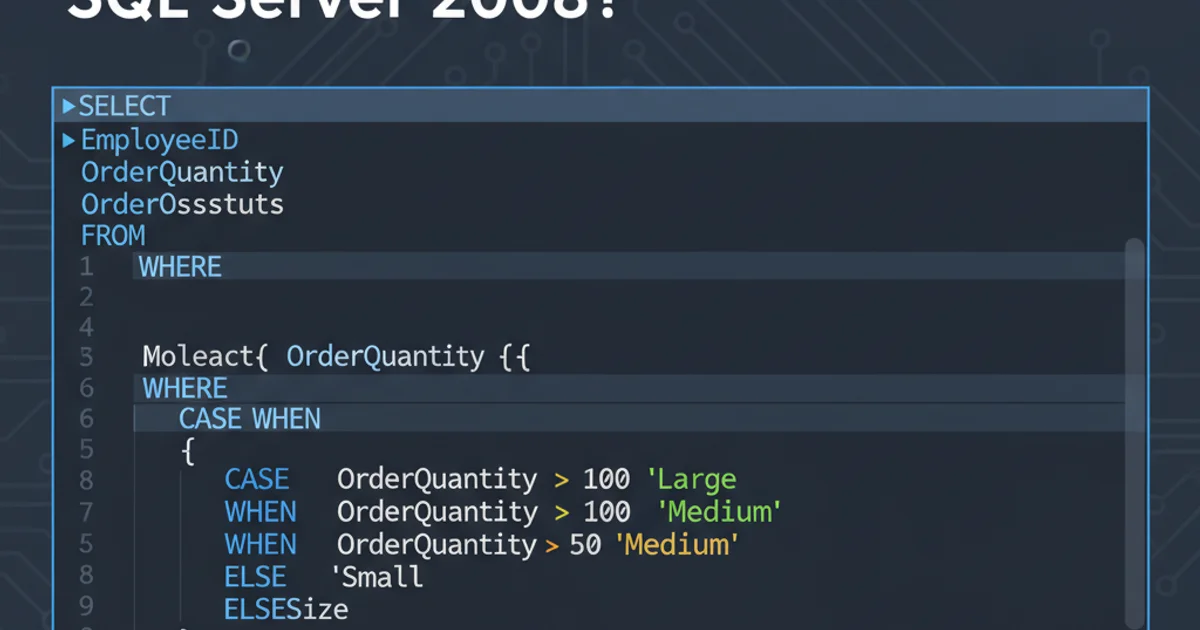How do I do multiple CASE WHEN conditions using SQL Server 2008?
Mastering Multiple CASE WHEN Conditions in SQL Server 2008

Learn how to effectively use multiple CASE WHEN statements in SQL Server 2008 for complex conditional logic, data transformation, and reporting.
The CASE WHEN statement in SQL Server is a powerful construct that allows you to implement conditional logic directly within your SQL queries. It functions much like an IF-THEN-ELSE structure in procedural programming languages, enabling you to return different values based on various conditions. This article will guide you through using multiple CASE WHEN conditions in SQL Server 2008, covering both simple and searched CASE expressions, and demonstrating their application in real-world scenarios.
Understanding the CASE Expression Syntax
SQL Server supports two main forms of the CASE expression: the simple CASE expression and the searched CASE expression. Both can handle multiple WHEN conditions, but they differ in how they evaluate these conditions.
1. Simple CASE Expression
The simple CASE expression compares a single input expression to a set of possible values. It's concise when you're checking for equality against a specific column or value. Once a WHEN condition is met, the corresponding THEN result is returned, and the evaluation stops. If no WHEN condition matches, the ELSE result is returned (or NULL if ELSE is omitted).
SELECT
ProductName,
Category,
CASE Category
WHEN 'Electronics' THEN 'High-Tech'
WHEN 'Books' THEN 'Literary'
WHEN 'Food' THEN 'Consumable'
ELSE 'Miscellaneous'
END AS CategoryType
FROM
Products;
Example of a simple CASE expression with multiple WHEN conditions.
flowchart TD
A[Start Evaluation] --> B{Input Expression?}
B --> C{Category = 'Electronics'?}
C -- Yes --> D[Return 'High-Tech']
C -- No --> E{Category = 'Books'?}
E -- Yes --> F[Return 'Literary']
E -- No --> G{Category = 'Food'?}
G -- Yes --> H[Return 'Consumable']
G -- No --> I[Return 'Miscellaneous' (ELSE)]
D,F,H,I --> J[End Evaluation]Flowchart illustrating the logic of a simple CASE expression.
2. Searched CASE Expression
The searched CASE expression is more flexible and powerful. It allows you to specify a different Boolean condition for each WHEN clause, similar to a series of IF-ELSE IF statements. This is ideal when your conditions involve different columns, operators (e.g., >, <, LIKE), or complex logical combinations. Each WHEN condition is evaluated independently until one evaluates to TRUE.
SELECT
OrderID,
OrderTotal,
OrderDate,
CASE
WHEN OrderTotal > 1000 AND OrderDate >= '2008-01-01' THEN 'Large Order (New Year)'
WHEN OrderTotal > 500 THEN 'Medium Order'
WHEN OrderTotal <= 500 AND OrderTotal > 0 THEN 'Small Order'
WHEN OrderTotal IS NULL THEN 'Pending Total'
ELSE 'Invalid Order'
END AS OrderClassification
FROM
Orders;
Example of a searched CASE expression with complex conditions.
ELSE clause in your CASE expressions. This ensures that every possible scenario is handled, preventing unexpected NULL values and making your code more robust and predictable.Common Use Cases for Multiple CASE WHEN Conditions
Multiple CASE WHEN conditions are invaluable for various SQL tasks:
1. Data Transformation and Categorization
Assigning categories or labels to data based on specific criteria, as shown in the examples above. This is crucial for reporting and analysis.
2. Conditional Aggregation
Performing different aggregations (e.g., SUM, COUNT) based on conditions within the same query. This is often used with GROUP BY to create pivot-like results.
3. Conditional Ordering
Customizing the sort order of results based on specific column values or conditions within the ORDER BY clause.
4. Dynamic Column Values
Generating dynamic column values for reports where the content of a column depends on other column values or external factors.
Performance Considerations
While CASE WHEN is highly flexible, be mindful of performance, especially with very complex or numerous conditions on large datasets. SQL Server's query optimizer is generally efficient, but excessive complexity can sometimes lead to performance degradation. Consider these points:
WHEN clauses matters in both simple and searched CASE expressions. Once a condition is met, subsequent WHEN clauses are not evaluated. Place your most restrictive or frequently met conditions first to potentially improve performance.For extremely complex logic or very large numbers of conditions, consider if a different approach might be more efficient, such as creating a lookup table, using a series of UNION ALL queries, or even moving some logic to application code if appropriate. However, for most scenarios, CASE WHEN is the idiomatic and efficient choice within SQL.